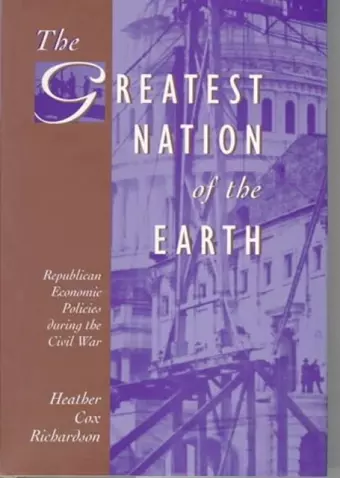The Greatest Nation of the Earth
Republican Economic Policies during the Civil War
Format:Hardback
Publisher:Harvard University Press
Published:1st Jul '97
Currently unavailable, and unfortunately no date known when it will be back

The virtues of this book are that it fills an important gap between two classics in the field: Eric Foner's Free Soil, Free Labor, Free Men and David Montgomery's Beyond Equality. Those books outlined the Republican party's antebellum social and economic ideology and its postwar attitudes toward labor; Richardson's book narrates in detail the party's economic and social legislation during the war, and links this legislation effectively to the coherent ideology, or world-view, of the party's principal spokesmen. Richardson does an excellent job of describing the economic and social ideas of leading Republican theorists and politicians. The writing is clear and the narratives of congressional debates and legislation are lucid. -- James M. McPherson, author of Battle Cry of Freedom: The Civil War Era
Rejecting the common assumption that domestic legislation during the Civil War was a series of piecemeal reactions to wartime necessities, Heather Cox Richardson argues that Republican party members systematically engineered pathbreaking laws to promote their distinctive theory of political economy.
While fighting a war for the Union, the Republican party attempted to construct the world’s most powerful and most socially advanced nation. Rejecting the common assumption that wartime domestic legislation was a series of piecemeal reactions to wartime necessities, Heather Cox Richardson argues that party members systematically engineered pathbreaking laws to promote their distinctive theory of political economy.
Republicans were a dynamic, progressive party, the author shows, that championed a specific type of economic growth. They floated billions of dollars in bonds, developed a national currency and banking system, imposed income taxes and high tariffs, passed homestead legislation, launched the Union Pacific railroad, and eventually called for the end of slavery. Their aim was to encourage the economic success of individual Americans and to create a millennium for American farmers, laborers, and small capitalists.
However, Richardson demonstrates, while Republicans were trying to construct a nation of prosperous individuals, they were laying the foundation for rapid industrial expansion, corporate corruption, and popular protest. They created a newly active national government that they determined to use only to promote unregulated economic development. Unwittingly, they ushered in the Gilded Age.
This is a welcome and well-written study. It is political rather than economic history, charting the evolution of particular measures without resort to models or econometrics. The outline of the story is familiar. During the Civil War Congress launched politics of lasting importance: a government guaranteed inconvertible currency, a high tariff with protection, the National Banking, Pacific Railroad, and Homestead Acts. This book takes up each topic in turn…and analyses their often complex legislative history… The principal sources are the Congressional Globe, Executive Documents, Miscellaneous Documents, and congressional reports, but they are buttressed by wide knowledge of other contemporary printed and manuscript records. A very useful historiographical essay is included in the bibliography. In all, this is a model monograph on a significant subject. -- William Brock * American Studies in Europe *
Richardson studies public action and legislative outcomes in order to compare theory with practice. She is far too good a historian to get drawn into unnecessary debates which would detract from the story she is telling, but one of the most compelling reasons for reading this book is precisely the light that it sheds on what abstract ideas like ‘party ideology’ might actually mean when they are forced through the processing plant of congressional policy-making… The cleverness and clarity of this book are a product of its relatively tight focus… She lucidly sets out her evidence, elegantly explaining the procedural manoeuvers and the personal influences which shaped legislation… [This is] an admirable book about congressional policy-making, filling a long-overdue gap in the vast literature on the Civil War. -- Adam Smith * H-Net Reviews *
The virtues of this book are that it fills an important gap between two classics in the field: Eric Foner’s Free Soil, Free Labor, Free Men and David Montgomery’s Beyond Equality. Those books outlined the Republican party’s antebellum social and economic ideology and its postwar attitudes toward labor; Richardson’s book narrates in detail the party’s economic and social legislation during the war, and links this legislation effectively to the coherent ideology, or world-view, of the party’s principal spokesmen. Richardson does an excellent job of describing the economic and social ideas of leading Republican theorists and politicians. The writing is clear and the narratives of congressional debates and legislation are lucid. -- James M. McPherson, author of Battle Cry of Freedom: The Civil War Era
An excellent study of the economic ideas of the Republican party during the Civil War, and more particularly, of the legislation passed by the Civil War Congresses (the 37th and 38th Congresses). The real strength of Richardson’s book is her ability to lucidly explain Republican economic thought and untangle the complicated legislative process by which this thought was converted into economic legislation. The book skillfully analyzes the rise of cross-cutting influences. Richardson’s discussion of bonds, banks, and the currency is the clearest analysis available of these exceedingly complex subjects. An important contribution to Civil War historiography. -- William E. Gienapp, author of The Origins of the Republican Party, 1852–1856
ISBN: 9780674362130
Dimensions: 235mm x 156mm x 30mm
Weight: 649g
352 pages